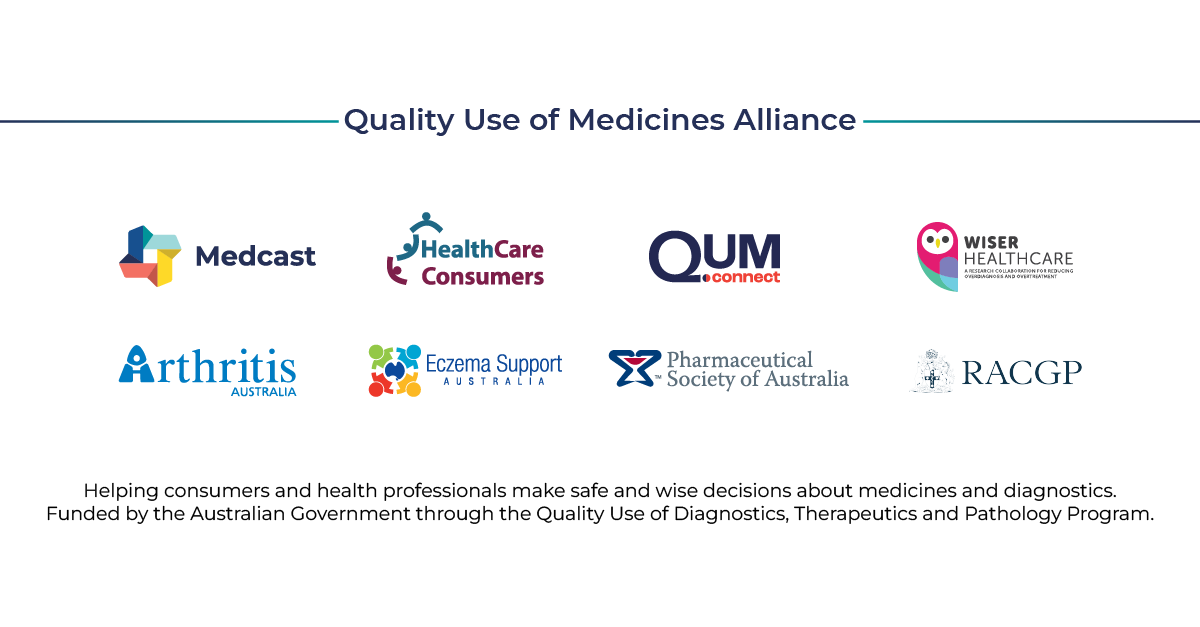Eczema is a chronic condition, but many patients are literally stuck in a treatment maze.
The Australian Government’s decision to defund NPS MedicineWise in 2022 was a contentious one.
Now that the dust has settled, we are starting to see the impact of the quality use of medicines (QUM) being opened up to market forces: Organisations with a broad range of disciplines, expertise and audiences are coming together to make a real difference in health education. The Quality Use of Medicines Alliance – a consortium led by Medcast and the Health Care Consumers’ Association is a case in point.
Our systematic approach to understanding practice challenges and synthesising evidence about eczema, has laid bare some uncomfortable truths, which as health professionals we need to acknowledge. On the surface, eczema is a common presentation in primary care and generally diagnosed without much complication. Diagnosis and management is not without some complexity, but generally, my belief was that I was well informed and confident that patient’s needs and expectations were being addressed.
However, this is where our research and co-design process, with both consumer and clinician input, pulled back the curtain to reveal the reality and complexity of the consumer experience for the 2.8 million Australians living with eczema. Here’s a taste of what we found:
- An overwhelming range of treatment options to choose from. This includes moisturising creams, lotions and ointments, as well as topical corticosteroids with different bases, potencies, strengths and brands. Depending on which pharmacy a consumer visits – or who they speak to – differing advice as to which ones to purchase.
- Complex instructions for patients to recall. For each topical product they use, they need to have a clear understanding how to use: frequency of use, e.g. once a day, twice a day, or after showers; duration of use, e.g. for 1 week, 2 weeks, until it starts to clear, or until after it has cleared; and which part of the body to apply to as different parts may need different products.
- Contradictory and inconsistent instructions from dermatologists, GPs, nurses, pharmacists, and medicine information leaflets leaving consumers confused. For example, for the same topical corticosteroid treatment a consumer could be told to apply it liberally, sparingly, by fingertip amounts or to think in terms of number of tubes. Or to apply different products for varying durations of time.
- A lack of quality time for patients with health professionals which hinders ongoing management and understanding of the impact of eczema on daily life, including mental health, where there may be opportunities for other advice and support.
- An over-reliance on social media and exposure to myths about the safety of topical corticosteroids and exaggerating the risk of harm, such as skin thinning and withdrawal symptoms.
- Use of alternative and questionable remedies which are expensive and don’t live up to expectation.
In the face of all of this evidence it also became clear that health professionals are unsupported too.
For health professionals in primary care the perennial issue is a lack of time. In the context of a 15-minute consultation there is not enough time to counsel patients effectively about management options and approaches, let alone actually demonstrate how to use them. The same can be said of pharmacists in busy retail settings.
So how do we address these uncomfortable truths?
The Quality Use of Medicines Alliance is now providing solutions and support for health professionals through a strategic and systematic approach:
- Targeting the practice gaps and learning needs for all health professionals in primary care including GPs, pharmacists, nurses or Aboriginal health workers/practitioners.
- Improving the consistency of information and communication between health professionals and consumers.
- Point of care resources that offer practical support for complex issues, such as patient care plans and management algorithms. Also, through solutions that are tailored to learning preferences such as virtual face-to face learning, peer group learning, train-the-trainer packages, webinars, podcasts, and communication videos.
The culmination of this approach is QHUB – a dedicated platform for free independent quality use of medicines education hosted by Medcast. Here, health professionals can choose from a wide range of free, high quality, independent education across a variety of learning options including webinars, virtual small group learning, podcasts, clinical updates, and audit activities for practices. All this is designed to keep health professionals up-to-date, in an easy and accessible way and meet CPD requirements with points in all 3 CPD categories.
Helping address these issues we’ve uncovered about eczema is just the start. Over a 2-year period we will be supporting health professionals and consumers across a number of priority health areas including gout, antidepressants in older people, and anticoagulants.
This approach is central to understanding the quality use of medicines. The accepted wisdom is not always correct and what is sometimes thought of as simple, and routine is often not. As one of the new custodians of QUM, the role of the Quality Use of Medicines Alliance is to continue to uncover these uncomfortable truths so that the lives of consumers can be improved.
For more information visit medcast.com.au/qhub
A/Prof Stephen Barnett is the Medical Director of Medcast, a GP in the Southern Highlands of NSW and an experienced GP supervisor and Medical Educator.
He is a Clinical Associate Professor with the University of Wollongong Graduate School of Medicine and holds a PhD in e-learning and GP Training



